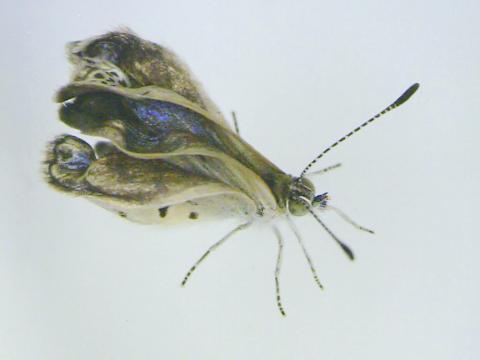Genetic mutations have been found in three generations of butterflies from near Japan’s crippled Fukushima Dai-ichi nuclear plant, scientists said yesterday, raising fears radiation could affect other species.
About 12 percent of pale grass blue butterflies that were exposed to nuclear fallout as larvae immediately after the tsunami-sparked disaster had abnormalities, including smaller wings and damaged eyes, researchers said.
The insects were mated in a laboratory well outside the fallout zone and 18 percent of their offspring displayed similar problems, said Joji Otaki, associate professor at Ryukyu University in Okinawa.

Photo: EPA
That figure rose to 34 percent in the third generation of butterflies, he said, even though one parent from each coupling was from an unaffected population.
The researchers also collected another 240 butterflies in Fukushima in September last year, six months after the disaster. Abnormalities were recorded in 52 percent of their offspring, which was “a dominantly high ratio,” Otaki said.
Otaki said the high ratio could result from both external and internal exposure to radiation, from the atmosphere and in contaminated foodstuffs.
The results of the study were published in Scientific Reports, an online research journal from the publishers of Nature.
Otaki later carried out a comparison test in Okinawa exposing unaffected butterflies to low levels of radiation, with the results showing similar rates of abnormality, he said.
“We have reached the firm conclusion that radiation released from the Fukushima Dai-ichi plant damaged the genes of the butterflies,” Otaki said.
The earthquake-sparked tsunami of March last year knocked out cooling systems at the Fukushima Dai-ichi nuclear power plant, causing three reactors to go into meltdown in the world’s worst atomic disaster for 25 years.
The findings will raise fears over the long-term effects of the leaks on people who were exposed in the days and weeks after the accident, as radiation spread over a large area and forced thousands to evacuate.
There are claims that the effects of nuclear exposure have been observed on successive generations of descendants of people living in Hiroshima and Nagasaki when the US dropped atomic bombs in the final days of World War II.
However, Otaki warned it was too soon to jump to conclusions, saying his team’s results on the Fukushima butterflies could not be directly applied to other species, including humans.
He added he and his colleagues would conduct follow-up studies including similar tests on other animals.
Kunikazu Noguchi, associate professor in radiological protection at Nihon University School of Dentistry, also said more data was needed to determine the impact of the Fukushima accident on animals in general.
“This is just one study,” Noguchi said. “We need more studies to verify the entire picture of the impact on animals.”
Researchers and medical doctors have so far denied that the accident at Fukushima would cause an elevated incidence of cancer or leukemia, diseases that are often associated with radiation exposure.
However, they also noted that long-term medical examination is needed especially due to concerns over thyroid cancer among young people.

The Central Election Commission has amended election and recall regulations to require elected office candidates to provide proof that they have no Chinese citizenship, a Cabinet report said. The commission on Oct. 29 last year revised the Measures for the Permission of Family-based Residence, Long-term Residence and Settlement of People from the Mainland Area in the Taiwan Area (大陸地區人民在台灣地區依親居留長期居留或定居許可辦法), the Executive Yuan said in a report it submitted to the legislature for review. The revision requires Chinese citizens applying for permanent residency to submit notarial documents showing that they have lost their Chinese household record and have renounced — or have never

A magnitude 5.6 earthquake struck off the coast of Yilan County at 12:37pm today, with clear shaking felt across much of northern Taiwan. There were no immediate reports of damage. The epicenter of the quake was 16.9km east-southeast of Yilan County Hall offshore at a depth of 66.8km, Central Weather Administration (CWA) data showed. The maximum intensity registered at a 4 in Yilan County’s Nanao Township (南澳) on Taiwan’s seven-tier scale. Other parts of Yilan, as well as certain areas of Hualien County, Taipei, New Taipei City, Taoyuan, Hsinchu County, Taichung and Miaoli County, recorded intensities of 3. Residents of Yilan County and Taipei received

Taiwan has secured another breakthrough in fruit exports, with jujubes, dragon fruit and lychees approved for shipment to the EU, the Ministry of Agriculture said yesterday. The Animal and Plant Health Inspection Agency on Thursday received formal notification of the approval from the EU, the ministry said, adding that the decision was expected to expand Taiwanese fruit producers’ access to high-end European markets. Taiwan exported 126 tonnes of lychees last year, valued at US$1.48 million, with Japan accounting for 102 tonnes. Other export destinations included New Zealand, Hong Kong, the US and Australia, ministry data showed. Jujube exports totaled 103 tonnes, valued at

BIG SPENDERS: Foreign investors bought the most Taiwan equities since 2005, signaling confidence that an AI boom would continue to benefit chipmakers Taiwan Semiconductor Manufacturing Co’s (TSMC, 台積電) market capitalization swelled to US$2 trillion for the first time following a 4.25 percent rally in its American depositary receipts (ADR) overnight, putting the world’s biggest contract chipmaker sixth on the list of the world’s biggest companies by market capitalization, just behind Amazon.com Inc. The site CompaniesMarketcap.com ranked TSMC ahead of Saudi Aramco and Meta Platforms Inc. The Taiwanese company’s ADRs on Tuesday surged to US$385.75 on the New York Stock Exchange, as strong demand for artificial intelligence (AI) applications led to chip supply constraints and boost revenue growth to record-breaking levels. Each TSMC ADR represents